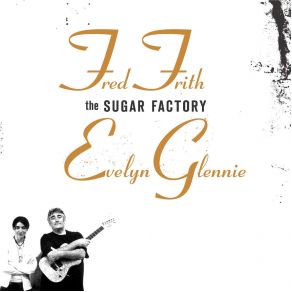The Sugar Factory
Download links and information about The Sugar Factory by Fred Frith, Evelyn Glennie. This album was released in 2007 and it belongs to Electronica, Jazz, Avant Garde Jazz, Avant Garde Metal, Classical genres. It contains 6 tracks with total duration of 48:57 minutes.

|
|
|---|---|
| Artist: | Fred Frith, Evelyn Glennie |
| Release date: | 2007 |
| Genre: | Electronica, Jazz, Avant Garde Jazz, Avant Garde Metal, Classical |
| Tracks: | 6 |
| Duration: | 48:57 |
| Buy it NOW at: | |
| Buy on iTunes $9.99 | |
| Buy on iTunes $9.99 | |
| Buy on Songswave €1.38 | |
Tracks
[Edit]| No. | Title | Length |
|---|---|---|
| 1. | A Route of Wolves | 7:43 |
| 2. | In the World to Change the World | 7:54 |
| 3. | A Rag of Colts | 4:13 |
| 4. | Scuttlebutt | 6:07 |
| 5. | A Cast of Hawks | 7:55 |
| 6. | Walls Are Loosening | 15:05 |
Details
[Edit]This first meeting between British vanguard improviser Fred Frith and world-renowned drummer and percussionist Evelyn Glennie (who happens to be deaf) was created, for the most part, in a disused sugar factory where a makeshift studio was created and the two performers played 100 feet apart from one another. According to Frith's liner notes, the pretext was to make music for a documentary film by Thomas Riedelscheimer entitled Touch the Sound, based on Glennie's life as an artist. (She is the first percussionist ever to have a successful career as a soloist.) The music here is not the soundtrack to the film — which exists in its own right — but an album compiled by the pair from the total of the music they cut together. There are some re-recordings, but they are virtually indistinguishable from the material recorded at the sugar factory. (Once the listener engages the disc, it will be a surprise since the reverb — a natural part of the sound environment — never actually disappears.) Frith plays electric guitar, bass, organ, and "metal objects" with Glennie improvising on everything from drums, gongs, marimba, and vibraphones, steel drums, a toy piano, and bell-tree, and her voice, to name just some of the instruments and objects put into play here. Just under 50 minutes in length, and edited by Frith, who took his versions to Glennie before re-recording, this is a document that will be fascinating to those who are well-versed in the guitarist's own work, but may come as a shock to those who have heard Glennie's more cohesive work. It is divided into six tracks, but it needn't have been. It flows seamlessly from one piece to another, and feels like a complete collaborative work. Dynamics, textures, tensions, and aesthetic values complement one another nearly instinctively despite the challenges of the sound environments. Glennie is "noisier" than she normally is, but that's what makes this so compelling: there are moments here where all the cacophony results in a blisslike listening experience for the listener. Nowhere is this more true than on the album's final 15 minutes, in a work called "The Walls Are Loosening/A Little Prayer." (The latter end of that title is an actual composition by Glennie.) The sheer wail and whomp of large bassy drums are juxtaposed against electric guitar lines that range from near ambient to feedback-driven, from open strings left to resonate a bit to scree and skronk. But control is everything, and these two practice it at every turn, even at the work's most bombastic parts. There is little to hold on to and that is the desired effect: to let go. As the "walls loosen," every sound that emerges becomes a part of the bigger body of the work, the players and the listener. It's almost an aesthetic that came out of spontaneity and keen listening — as well as major-league ego control by the participants. The Sugar Factory is a listening experience unlike anything else. It's deep, humorous, sublime, rattling, and warm. It's a universe of sound and noise that becomes, by the time the disc has played its entire run of 49 minutes, a new approach to both playing and encountering that wonderfully magical and poetic thing called music.